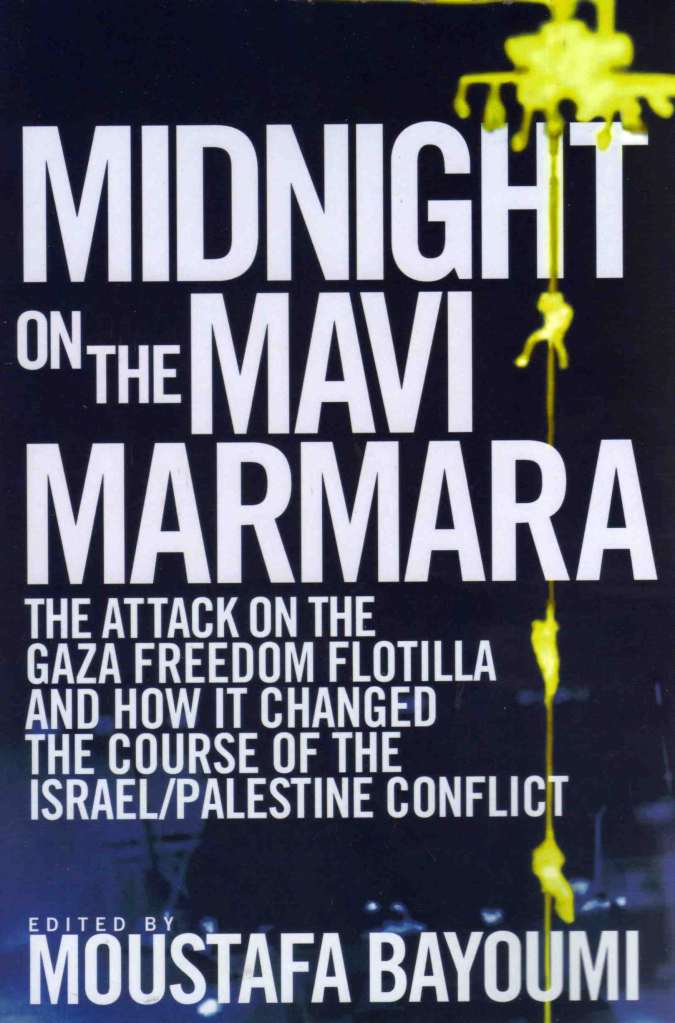I won’t forget the night of May 31, 2010, watching the live-streamed footage on my computer from the deck of the Mavi Marmara — the Turkish ship bound for the Gaza Strip, the head of an international aid flotilla. A few hours passed before the boarding occurred. The Twitter feed started up rapidly as the sound of a helicopter’s whirring sounded in the live-feed. My phone rang. “Are you watching this?” my friend whose family was originally from Gaza asked. The image died and within minutes I heard the news that they had been boarded and attacked. The news that a number of activists had been killed reached us quickly and a day of protest had already been arranged for the following day. The attack marks a turning point for international solidarity for Palestine and the Israel/Palestine conflict.
Moustafa Bayoumi, author of Midnight on the Mavi Marmara, has assembled an engaging anthology on the Mavi Marmara attack in 2010. His collection consists of pieces by 46 writers, including prominent journalists, authors and activists such as Omar Barghouti, Ali Abunimah, Norman Finkelstein, Max Blumenthal, Noam Chomsky, Stephen M. Walt, Alice Walker and Gideon Levy, among other notable contributors.
The pieces in the book are crucial reading for beginners to the issue. In the introduction, Bayoumi revisits the attack and sets the stage for those who may not be familiar with what happened. The book opens with an eye-witness account by Henning Mankell:
“We have been attacked while in international waters. That means the Israelis have behaved like pirates … The moment they start to steer this ship towards Israel, we have also been kidnapped. The whole action is illegal.”
The next chapter, “Understanding the Attack,” provides context of the situation and attempts to explain the Israeli government’s motivations for attacking an unarmed ship. Ha’aretz journalist, Gideon Levy, critiques the government’s attempts at spinning the attack as if it were legitimately acting in self-defense, while academic Rashid Khalidi reflects on the humanitarian conditions in the Gaza Strip, the Israeli attempt at dominating the public discourse on the subject of the attack, and the mentality of Israel’s political elite. A number of authors who contributed to this section observe the hypocrisy of the Israeli government’s claims to victimhood when reality tells a drastically different story. Alice Walker’s piece notes the complicity of many governments in the Gaza tragedy.
By the third chapter, “The Blockade of Gaza,” my blood really started to boil. Respected Israeli human rights organization Gisha lists the various items that are banned by the Gaza blockade. It is astonishing, for instance, that Gaza, a coastal society, is prohibited rods, various nets, buoys and ropes for fishing. Other prohibited items include sage, coriander, jam, vinegar, nutmeg, chocolate, fruit preserves and biscuits. The writings that follow this introductory piece focus more on the conditions in Gaza and how the blockade has caused the collapse of the Strip’s economy and the malnutrition of its people.
“Inside Israel,” provides insight into Israeli society itself and the siege mentality that dominates public discourse. There are writings from Israeli citizens critical of the siege of Gaza. There is some optimism in here, although most of it laments what they feel to be an ongoing degradation of Israeli society. This book was published before the massive protests against Netenyahu’s government however, so perhaps this section is due for an update. An interesting piece by Henry Siegman explores the wider discussion within the worldwide Jewish community on Israel and its relations with the Palestinians. In contrast, Yousef Munayyer describes a trend of impunity when it comes to Israel’s international conduct, citing one massacre after another where those responsible were not brought to justice.
The book’s last chapters provide context on the wider political fallout of the flotilla attack. Norman Finkelstein, Glenn Greenwald and Daniel Luban provide insight into the situation within the global Jewish Diaspora, and how many Jewish citizens of various countries have gradually distanced themselves from Israel. These authors reveal a complicated overall situation within Jewish communities and how a more open discussion of Israel and Zionism is emerging. This section leads into the books conclusion that describes the current Boycott, Divestment and Sanctions (BDS) movement and its recent victories, leaving the reader feeling more optimistic.
While its focus is primarily on Gaza, Midnight on the Mavi Marmara is a must read for those readers unfamiliar with the Israel/Palestine conflict. The book serves as an important reminder of the unfolding regime of dispossession and mistreatment that the Palestinians of Gaza face under siege — and what the subsequent large-scale diplomatic fallout following the attack of the Mavi Marmara may mean for the future of the region.—J. Zimmerman
J. Zimmerman is a freelance journalist with a degree in International Development Studies from York University. His work has been featured on CHRY 105.5FM and CKLN 88.1FM, as well as other campus-based radio stations. J. Zimmerman’s work is available largely on his YouTube channel: jmzimmerman1984



